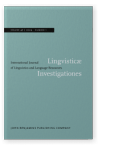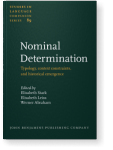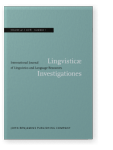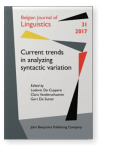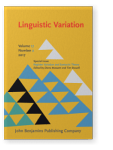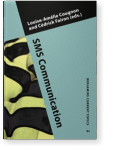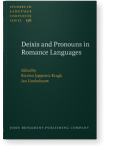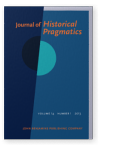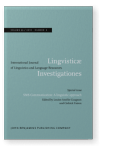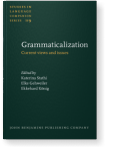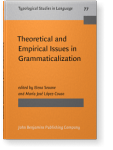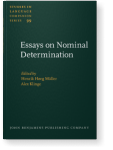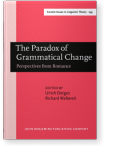Elisabeth Stark
List of John Benjamins publications for which Elisabeth Stark plays a role.
Journal
Title
Nominal Determination: Typology, context constraints, and historical emergence
Edited by Elisabeth Stark, Elisabeth Leiss and Werner Abraham
[Studies in Language Companion Series, 89] 2007. viii, 370 pp.
Subjects Historical linguistics | Semantics | Syntax | Typology
2023 Differential object marking in French: Myth or reality? Differential Object Marking in Romance: Towards microvariation, Irimia, Monica Alexandrina and Alexandru Mardale (eds.), pp. 56–84 | Chapter
This study is dedicated to the question whether French possesses (optional) DOM, i.e. direct object marking, which it answers in a negative way. French is traditionally considered to lack a differential marker for the direct object (cf. e.g. Körner, 1987). However, Fagard and Mardale (2014)… read more
2018 Microvariation morphosyntaxique galloromane: Enjeux et défis Lingvisticæ Investigationes 41:1, pp. 1–15 | Article
2017 A crowdsourcing approach to the description of regional variation in French object clitic clusters Current trends in analyzing syntactic variation, De Cuypere, Ludovic, Clara Vanderschueren and Gert de Sutter (eds.), pp. 76–103 | Article
Our contribution is dedicated to the empirical testing of alleged regional variants of object clitic clusters in modern French in France, Belgium and Switzerland. We provide some intriguing new insights into the regional distribution of non-standard variants and discuss one hypothesis on their… read more
2017 Subject drop in Swiss French text messages Register Variation and Syntactic Theory, Massam, Diane and Tim Stowell (eds.), pp. 251–271 | Article
In this paper, we present evidence in favour of a syntactic approach to subject drop in Swiss French text messages. Subject drop in our corpus follows patterns found in various so-called "written abbreviated registers" such as diaries, notes etc.: it occurs at the beginning of main sentences and… read more
2014 Negation marking in French text messages SMS Communication: A linguistic approach, Cougnon, Louise-Amélie and Cédrick Fairon (eds.), pp. 191–215 | Article
This study investigates the drop of the first clitic element, ne, of French sentential negation. It is based on 4,628 French text messages taken from the newly established corpus sms4science.ch. It shows that regional or stylistic factors do not play a major role in triggering ne deletion or ne… read more
2013 Clitic subjects in French text messages: Does technical change provoke and/or reveal linguistic change? Deixis and Pronouns in Romance Languages, Kragh, Kirsten Jeppesen and Jan Lindschouw (eds.), pp. 147–170 | Article
This study investigates the graphical realization of clitic subjects in about 4600 French text messages taken from the Swiss corpus of text messages 〈www.sms4science.ch〉. It analyzses different spelling strategies against the background of the present debate concerning the (still) argumental or… read more
2012 Negation marking in French text messages SMS Communication: A linguistic approach, Cougnon, Louise-Amélie and Cédrick Fairon (eds.), pp. 341–366 | Article
This study investigates the drop of the first clitic element, ne, of French sentential negation. It is based on 4,628 French text messages taken from the newly established corpus sms4science.ch. It shows that regional or stylistic factors do not play a major role in triggering ne deletion or ne… read more
2010 How the Latin neuter pronominal forms became markers of non-individuation in Spanish Grammaticalization: Current views and issues, Stathi, Katerina, Elke Gehweiler and Ekkehard König (eds.), pp. 273–294 | Article
This paper aims at adequately analyzing and classifying an important functional change inside the Spanish pronominal system. This system seems to formally preserve forms of the Latin neuter, which now have the very specialized function of denoting non-individuated referents, one of the whole set of… read more
2008 Double indirect object marking in Spanish and Italian Theoretical and Empirical Issues in Grammaticalization, Seoane, Elena and María José López-Couso (eds.), pp. 111–129 | Article
2008 Typological correlations in nominal determination in Romance Essays on Nominal Determination: From morphology to discourse management, Høeg Müller, Henrik and Alex Klinge (eds.), pp. 45–63 | Article
This paper discusses divergences and significant typological correlations found in the family of Romance languages, specifically French, Italian and Spanish. It proposes to reinterpret the complex system of indefinite nominal determination in two central Romance languages, viz. French and Italian,… read more
2008 The role of the plural system in Romance The Paradox of Grammatical Change: Perspectives from Romance, Detges, Ulrich and Richard Waltereit (eds.), pp. 57–84 | Article
This paper presents a diachronic formal morphosyntactic analysis of the role of the functional projection Pl/Pl* in Romance indefinite nominals, responsible for number and the countability distinction. Reinterpreting the complex system of indefinite nominal determination in two central Romance… read more
2007 Introduction Nominal Determination: Typology, context constraints, and historical emergence, Stark, Elisabeth, Elisabeth Leiss and Werner Abraham (eds.), pp. 1–20 | Miscellaneous
2007 Gender, number, and indefinite articles: About the 'typological inconsistency' of Italian Nominal Determination: Typology, context constraints, and historical emergence, Stark, Elisabeth, Elisabeth Leiss and Werner Abraham (eds.), pp. 49–71 | Article
This paper discusses some typologically signifi cant correlations in nominal determination systems found in the family of Romance languages, specifi cally French, Italian, and Spanish. It proposes to reinterpret the complex system of indefi nite nominal determination in French and Italian, which… read more
